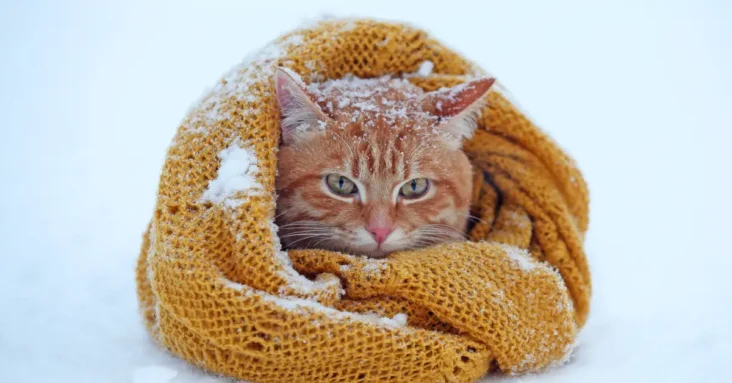Introduction:
Cats are known for being independent and resilient, but just like humans, they can catch colds, too. When your cat starts sneezing, has a runny nose, or has watery eyes, it’s natural to wonder: can cats get colds? The answer is yes—and understanding what a feline cold is, what causes it, and how to treat it can make a huge difference in your pet’s recovery. Learning how cat colds work, what signs to look for, and how to treat or prevent them can help your furry friend stay comfortable and healthy.
Can Cats Get Colds?
Understanding Feline Upper Respiratory Infections:
When people refer to a “cat cold,” they usually mean an upper respiratory infection (URI). These infections affect the nose, throat, and sinuses, causing symptoms similar to a human cold. While not usually dangerous, they can become serious if left untreated, especially in kittens, senior cats, or those with weakened immune systems.
What a “Cat Cold” Actually Is?
A cat cold is typically caused by a virus and sometimes by bacteria. The symptoms are mild in most cases but can lead to complications like secondary infections or pneumonia.
Difference Between Colds and More Serious Respiratory Issues
While a cold causes sneezing and nasal discharge, more serious respiratory problems—like feline asthma, pneumonia, or chronic infections—can lead to labored breathing, high fever, and lethargy. That’s why knowing the difference and monitoring symptoms is crucial.
What Causes Colds in Cats?
Common Viruses Behind Cat Colds:
Two main viruses are responsible for most cat colds:
Feline Herpesvirus (FHV-1)
This virus causes feline viral rhinotracheitis, which brings on sneezing, nasal congestion, and eye discharge. Once infected, cats often carry this virus for life, with occasional flare-ups during stress or illness.
Feline Calicivirus (FCV)
Calicivirus also affects the respiratory system and can cause ulcers in the mouth, drooling, and fever. It’s highly contagious among cats and is one of the main viruses targeted by routine vaccinations.
How Cats Catch Colds
Cats typically catch colds through direct contact with an infected cat, but indirect contact can also spread the virus.
Contact with Other Cats
Cat colds are common in multi-cat households or places like shelters where many cats live closely together. One sneeze from an infected cat can spread viral particles into the air or onto surfaces.
Exposure in Shelters or Outdoor Environments
Shelters, boarding facilities, and outdoor areas increase the risk of infection. Cats exposed to stressful environments, cold weather, or unclean conditions are likelier to catch a cold.
Can Indoor Cats Get Colds?
Yes. Even indoor cats can catch colds if you bring home a virus on your clothes or hands after handling another cat. Also, the virus can spread easily if you adopt a new pet or foster a cat.
Symptoms of a Cat Cold
Early Signs to Watch For
The first symptoms are usually mild and include:
- Sneezing
- Runny nose or nasal discharge
- Watery eyes
- Mild coughing
- Decreased energy
Cats may also hide more or show less interest in playing. Monitoring these early signs can help you act quickly and prevent complications.
When Symptoms Become Serious
Some cats develop more severe symptoms that require veterinary attention:
- Loss of appetite
- Difficulty breathing
- Fever
- Lethargy or lack of movement
- Green or yellow mucus
If you notice any of these signs, call your vet immediately. A cat that stops eating for more than a day needs urgent care.
How to Treat a Cat With a Cold
Home Care and Comfort Tips
Most cat colds resolve with supportive care at home. Here’s how to help your cat recover:
- Hydration: Make sure your cat drinks enough water. Wet food can also help maintain hydration.
- Warm Environment: Keep your cat in a cozy, draft-free area. Use blankets or a heated pad if necessary.
- Clean Eyes and Nose: Gently wipe away discharge with a warm, damp cloth.
- Steamy Bathroom Sessions: Let your cat sit in the bathroom while you run a hot shower. The steam can ease nasal congestion.
- Encourage Eating: If your cat isn’t eating, try warming their food slightly or offering a favorite treat.
When Rest Is Enough
Mild colds often improve within 7–10 days. If your cat remains active, eats well, and only has mild symptoms, rest and care at home might be all they need.
When to Call the Vet
Call your vet if:
- Symptoms last longer than 10 days.
- Your cat has difficulty breathing.
- They stop eating or drinking.
- You see signs of eye ulcers or persistent coughing.
Vets may recommend fluids, antiviral medications, or antibiotics for secondary infections. In some cases, hospitalization might be necessary.
Can You Prevent Colds in Cats?
Tips to Protect Your Cat
Vaccination
Vaccinating your cat against common viruses like FHV-1 and FCV is one of the most effective ways to prevent colds. Even if your cat is strictly indoors, vaccines are essential.
Clean Environment
Keep your cat’s living space clean. Regularly disinfect litter boxes, bedding, food bowls, and toys, especially in multi-cat households.
Limiting Exposure to Infected Cats
Avoid introducing your cat to unfamiliar animals unless they’re healthy and vaccinated. Quarantine new cats for at least a week to prevent potential illness from spreading.
Frequently Asked Questions:
Can I Catch a Cold From My Cat?
No. Cat colds are caused by viruses specific to cats. They don’t infect humans, so you can safely care for your cat without risk to yourself.
Are Cat Colds Contagious to Other Cats?
Yes. Cat colds are highly contagious among felines. If you have more than one cat, isolate the sick one and disinfect shared items.
Is It Safe to Use Human Cold Medicine for My Cat?
Never give your cat human medications unless your vet specifically prescribes them. Many over-the-counter drugs are toxic to cats and can be fatal.
How Long Do Cat Colds Usually Last?
Most cat colds clear up within 7–10 days. If symptoms persist beyond that or worsen, visit your vet for further treatment.
Can Cats Get Colds More Than Once?
Yes. Cats can catch colds multiple times, especially if they carry the herpesvirus. Stress or illness can reactivate the virus, even years later.
Conclusion:
If your cat seems under the weather, keeping calm, monitoring symptoms, and offering proper care can help them recover comfortably. Always keep your vet in the loop when you notice unusual signs.







GIPHY App Key not set. Please check settings